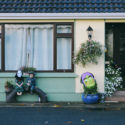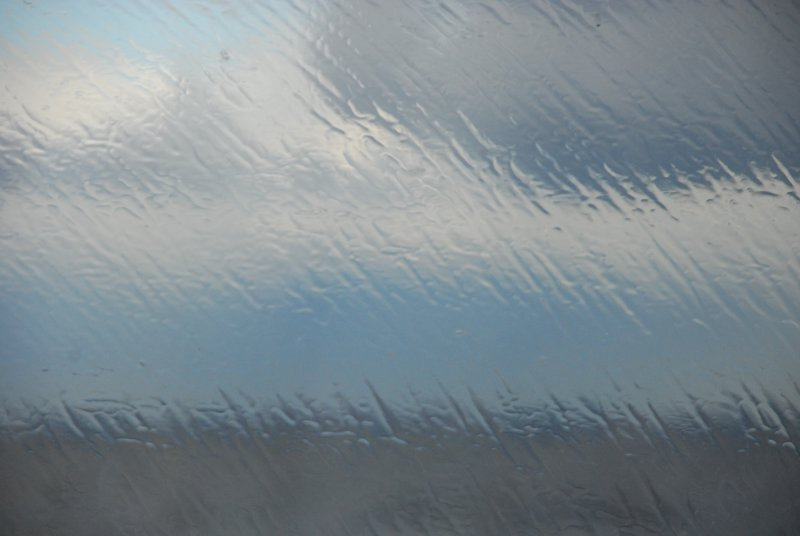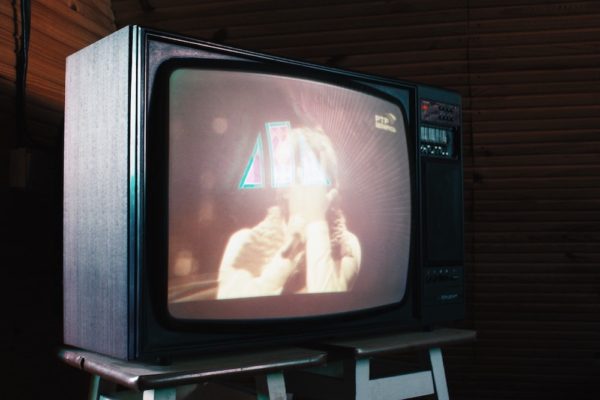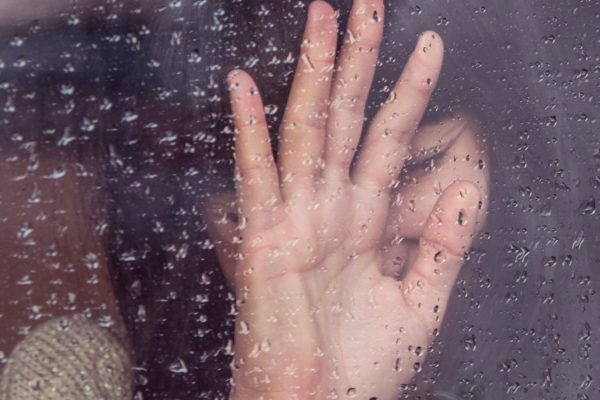Simon knows this is anger inside of him but it doesn’t feel the way he remembers it. It isn’t all hot and bubbling and spilling over. Instead, it is quite still within. Like numbness, only not in the way it sometimes means ‘nothing.’
He is holding the lamp like a golf club. The way you would hold a baby bird, he remembers someone saying. Palms facing inward, toward each other. The left hand poised in a handshake, the right hand just under. No gap between the hands. Not the most natural, or the most comfortable, way to hold a lamp but there it is. Simon lifts it up and brings it down. The swing is complex. The swing is key. It begins with the stance, the body’s center of gravity. The swing, Simon, the swing! For God’s sake, it’s not that difficult! Hundreds of dollars in lessons and you’d think you’d have gotten it by now. The swing is key.
But Simon doesn’t swing from right to left. Instead, he lifts the lamp up and brings it down. Still, the swing is key and the instructions are more or less the same. The arms must draw back in a straight line, only this time toward the ceiling. Wrists cocked, elbows hinged, the down swing begins not with the hips but the shoulders. The timing must be precise. Eyes must be focused on the ball. No blinking.
Over and over again, he lifts it up and brings it down. The swing is key. A dull thud. He lifts it up and brings it down. Thud. Up and down. Thud. Up, down, thud.
The blood is slick and warm. And carmine. It gets everywhere. Up, down, thud. It’s on his cheeks, his nose, his ears. There’s a drop caught in his eyelash. He tries to blink it away. The blood is in his hair. Up, down, thud. If he doesn’t wash it off soon, it is going to dry there and he won’t be able to get it out. Thud. He’ll have to cut it off then. He’ll have to cut it all off even though he looks terrible with short hair. Not like Eddie. Thud. Eddie looks good in anything. Thud. The blood gets all over the sheets. The new sheets. The white sheets. The ones she had waited anxiously to go on sale and, when they finally did, had gone all the way to town to buy. Thud. She’s going to be so mad in the morning. Thud.
Simon almost giggles at the thought.
He thinks how strange it is that he holds the lamp so, like an eight iron. Or a five iron. Or maybe a wood. Simon doesn’t really know the difference. Golf isn’t his thing. Golf was his father’s thing. His father tried to make it Simon’s thing – all those days out on the green, the evenings at the range, bucket after bucket of balls with that loud clang as the vending machine spat them out, the feeling of dimple under palm. Thud. Thud. Thud.
Simon thinks of Eddie. He sees Eddie’s face the way it appeared on TV tonight: hair slicked back, a smile on his face (slightly smug) with those dimples, nestled into a tux. Eddie, looking all successful and happy. A good photo to use was what Simon thought. Conveyed something important and weighty, like the terrible waste of youth, of life.
It has been a long time since he last saw Eddie. Simon and Mag were sending him off at the train station. Eddie with his hair bent the wrong way because of the wind, and eyes glazed over and barely open for he was bound on the early morning train. Goodbye, Eddie. Thanks for coming, guys. Not a problem. Now you be safe out there. ‘Course I’ll be fine. You’re the one who needs looking after. Mag, you hear that? Take care of my boy for me. Until we meet, Ed. Yeah, come on down to London when I get settled in, yeah?
Then it was, Bye, Eddie. Bye, guys. And the next time Simon sees Eddie is with his face on the screen, and the news anchor is saying how actor Edward Lee was killed in a car accident earlier that day, and Simon is thinking that he has forgotten Eddie’s name is Edward and thinking that thought about the photo being a good photo to use.
Eddie’s face disappears and it’s Magdalene’s face that Simon sees again. Magdalene under the terrible hardness of the lamp. Maggie whose blood is now trickling onto the Turkish carpet, the beautiful hand-woven silk carpet with the fringed edge and knot density of 500. Mags. Magda. Magsie. Mag without the ‘s’ at the end. Darling. Lover. Wife. Lying on the bed, crease in her cheek frozen, body quiet and cold, but slick, warm blood all over.
She isn’t laughing anymore.
Maggie has this way of laughing. Curt and snort-like, but it goes on and on. Smart, elegant Magdalene and her curt, snort-like laugh. Simon hardly ever laughs along with her. They don’t find the same things funny. Usually, she laughs at something she says. Usually, it’s something unpleasant. Often, he is involved.
Tonight, they had both been sighing over Eddie and things had been alright. They were holding hands and sighing the same note. Simon felt closer to his wife than he had in a while. Then he said something about I wonder and Maggie’s face changed. She wanted to know what he meant by wondering. Did he regret not going to London with Eddie, she asked. Had she and the baby wrongfully made him stay? No, Simon said. He was merely wondering what life would be like if he had gone to London to become a painter like he wanted to. Or even if he hadn’t gone to London but had found a way to work on painting.
Oh, it’s the painting, is it? she said. The painting’s the thing. And she laughed and Simon could feel them falling out of sync. She laughed and said, That’s alright then. I was worried it was Eddie you were wondering about. Sweetheart, you know painting backdrops for school plays doesn’t make you a painter right?
Simon felt the anger beginning then, something inside of him clenching for the first time since he told himself he was a husband and a father now, and he would be a good and kind one, and would not feel impatience or bitterness or regret; that his life would now be split into before and after Beatrice (for that was what he would name her), Beatrice who would raise his life above the average. But he willed the anger to go away. He counted to ten, then to twenty. He inhaled and exhaled. The anger went away and he remained good and kind.
Later in bed, Simon had reached for Maggie. He wanted to let her know that he was still the same person she married. He wanted to let her know he forgave her careless cruelty, that he still loved her. But she pushed his arm away and said, “Not tonight.” Then, “God, I don’t know what it is with you men. That’s all you think about, isn’t it? And for Christ’s sake, Eddie just died.”
Then she made that sound, curt and snort-like. And the faint outline of the lamp became the contours of her face. And the lampshade became the arch of her forehead, the flashing of the bulb her dimming eyes. And Magdalene became Eddie, and Eddie became Magdalene again, and her blood, slick and warm and carmine, all over.
The bulb goes out. For a while, nothing moves. The curtains across the two open windows behind the bed are still. Even the blood stops dripping from the sheets (the new sheets!) onto the floor. It stops spreading across the Turkish carpet, the beautiful hand-woven silk carpet with the fringed edge and knot density of 500.
Mags?
The splinters of her name catch in his throat and tears through him like shrapnel. Simon feels himself splitting into millions of fragments, afterimages, ghosts. He is crouched on the bed, his hand caught mid-swing, staring into the space where Magdalene’s face must be. Her eyes are either open or close. If he could see them, just see them, he thinks he will be able to look straight into them for the first time. Or through them and out the other side where maybe Eddie is. Simon is standing at the far end of the bedroom, seeing himself on the bed and noting how the moonlight frames his body. He is in the mirror watching himself watching. Watching himself walk into the room and fall to his knees crying. He is holding Mags to him, whispering something into her ear. He is pressing his lips to her face, her neck, her breasts, her hands. He is holding the back of his palms to her face as he watches himself roll the rug up, watches himself scrub at the floor, watches himself curse Maggie for dripping all over. Simon is in the bedroom and he is in the living room, on the couch, watching the news and seeing Eddie come on the screen. He gets up, forgets himself, and leaving himself standing, sits back down. He pauses, remembers. And he is moving boxes into the apartment and carrying paintings into the storeroom. He is setting up the cot, newly purchased from IKEA. He is trying to count how many screws he has. He is twisting them into the wood. He is twisting them out of the wood. He is taking the cot apart. He is placing the screws into little Ziploc bags so he doesn’t lose them for next time. He is lying on the floor breathing hard, then not at all, then breathing hard again, almost gasping. He is moving to sit next to himself on the couch. They don’t say a word.
Simon lets go of the lamp and it drops to the floor with a curt thump. Everyone hears and looks up, looks toward the version of him who is on the bed. Relieved by the weight of the lamp, Simon slumps over, sees himself slump over, feels it again and again. Then he sits upright like a marionette pulled back into action. His left hand goes up to his chin. Simon feels the thumb folded into fist, the nail cutting into palm. He turns his head. Every Simon catches the eyes of every other Simon. Each jerks back, startled. Someone screams.
He feels the roaring at the back of his throat but hears the sound come from across the room. Then everyone is running, the one on the bed falling out of it and right into a wet spot on the carpet. Simon grimaces. His toes cringe and curl in, applying pressure on the corn on his right big toe. They all feel it throb. They stumble out of the room, all at Simon’s heels, their feet falling into step with each other, falling in with the rhythm of their thud thud thudding hearts their nerves the corn on the toe all the corns on all the toes hands trail wall rounds corner enters kitchen fingers grope flips switch.
The light comes on and Simon winces. He pauses, body poised, then relaxes. He shakes it off. The kitchen is as they had left it only hours before, only now the soapsuds on the sink have dried into white rings and spots. Simon finds that he is parched. He opens a cabinet and selects from among the wide selection of teas a box of chamomile tea, something to soothe him and help him get back to sleep. He pours a little boiling water into a ceramic teapot, lets it stand for a while, and then empties it. He puts one heaped teaspoon of loose tealeaves into the teapot. He pours more water into the pot and lets it steep.
Simon makes for the television but stops. He cannot bear to hear about Eddie again. Late-night TV was all reruns and careless, lazy, unoriginal programming. He also doesn’t want to wake Maggie so instead he paces the room. When the tea is ready, he grabs a mug from the drying rack and pours from the pot. Simon forgets the strainer so the leaves get into the cup. He empties it and pours himself a new cup, this time remembering the strainer. Simon stands with one hand on his waist and drinks his tea, which will soothe him and help him get back to sleep. He is so tired. He thinks of taking the day off tomorrow and doing the grocery shopping once for a change.
As Simon turns to the refrigerator to take stock, he catches sight of a photograph—it’s Simon and Eddie sitting in front of Grogans in Dublin on a sunny afternoon, pints and toasties in front of them. They are smiling, so far away from the anger that is impatience, bitterness, and regret all rolled into one. Maggie took the picture; Simon can’t remember if she was smiling too. She didn’t like Eddie much. She thought he was a bad influence, what with his smoking and drinking, and she didn’t like that they were always talking about art and literature and music when she was around because what did she know or care about those things? But Simon liked Eddie and he liked Maggie, and because he decided he liked Maggie a little more than he liked Eddie, he hadn’t gone to London. There was the baby to think about too, for a while. And Simon gave up his painting even though Eddie thought he was brilliant, and the art teacher thought he had some talent, and he had had a little exhibition of his own in college where he sold several small pieces, because Maggie said that she thought he was very good too but very good wasn’t enough and that was all he was. So even though he really liked painting, he started selling insurance, which as it turned out he was more than very good at. And at the end of it all, he has a house and suits and tea, and he goes on holidays with Maggie and they make love occasionally, and what more (than a life) could one ask for?
“Oh God!” Simon cries. “What have I done?”
He almost drops the cup but steadies himself in time. He puts the cup down, turns quickly to the sink. He puts a hand under the running tap. Then he brushes his hand through his hair several times until he gets it all. His hair is all wet now. Clean, but wet and dripping. The tap too, dripping. And the water swirling down the drain, laced with traces of carmine.
—
Cheryl Julia Lee is the author of “We Were Always Eating Expired Things” (Math Paper Press, 2014), which was shortlisted for the Singapore Literature Prize in 2016. Her creative work can also be found in “QLRS”, “Icarus”, and “Prick of the Spindle”, among others. She is currently a PhD candidate at Durham University.




